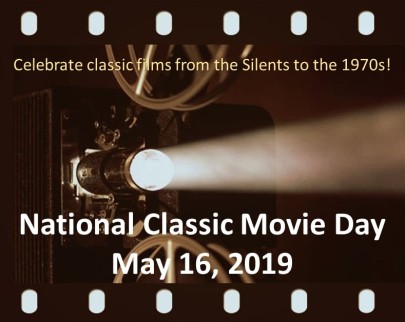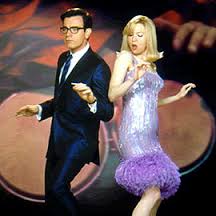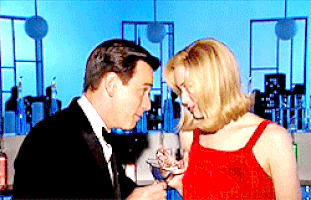Once again I’ve fallen off the posting train. I need to make it more of a habit, but I struggle to find time. Then, I had trouble with my WordPress account and I couldn’t post. I finally got that fixed. I didn’t want to miss posting on National Classic Movie Day. I also plan to post about the late, great Doris Day soon.
For this year’s National Classic Movie Day, the Classic Film and TV Cafe are asking participants to post his or her top 5 favorite films from the 1950s.
Without further adieu, here are mine:

The Long, Long Trailer (1954)
This is my absolute favorite movie of all time. I have probably seen it a hundred times (no exaggeration). I’m a big fan of I Love Lucy and Lucille Ball. The Long, Long Trailer is basically a 90-minute I Love Lucy episode. Ball and Desi Arnaz’ (aka Lucy and Ricky Ricardo on I Love Lucy) character’s first names in ‘Trailer’ are very similar to those of their Ricardo counterparts– Tacy and Nicky, respectively. This MGM comedy is hilarious and I never tire of it, even though I’m at the point where I can recite the dialogue. Quotes from this film regularly make it into everyday conversations I have with friends and family (only those who have seen this film of course). My favorite quote to use, while driving, is “Turn right here, left.”
The Long, Long Trailer tells the story of Tacy and Nicky Collini, newlyweds who are embarking on a road-trip for their honeymoon: Los Angeles to Colorado. The Collinis decide to purchase a 40′ New Moon trailer for their journey. The film depicts the Collinis trying to handle trailer life and all the trials and tribulations that come with it: noisy trailer parks, parking on uneven surfaces, getting stuck in the mud, spending the night on a noisy highway, weight limits, cooking, parking, backing in, and more. Will the newlyweds’ marriage survive the trip?
My favorite part of the movie is when Tacy and Nicky decide to go off-roading and end up stuck in the mud. The trailer is all whopperjawed. Tacy and Nicky get through dinner and go to bed. Nicky is on the downhill side. He has no issues getting into bed. Tacy on the other hand, is on the uphill side and can’t stay in bed. One may ask why she doesn’t make her husband move over and she can share his bed. Well that would be the logical solution, but since this is Lucy, that isn’t going to happen. After a couple of feeble attempts to get into bed, the jack holding the trailer up (kind of) collapses in the mud and Tacy goes flying out the door. Nicky, awoken by his wife’s blood-curdling scream, comes to the door and says: “What’s the matter honey? Can’t you sleep?” While sitting in a 5′ deep mud puddle, Tacy gives him a look that could only convey “[expletive] you.”

Gidget (1959)
I’ve mentioned Gidget many times on this blog, but it’s worth mentioning again. I love this movie. I’ve seen it dozens of times and I never tire of it. Sandra Dee is adorable. James Darren is hunky. The story is relatable. Gidget was the start of the 1950s-1960s teen surf movie craze and I’m all in for teen surf movies. Of all the teen surf movies (the ‘Beach Party’ films, For Those Who Think Young, Gidget Goes Hawaiian, etc.) the original Gidget film is the best.
In this coming of age story, Sandra Dee plays the titular character, Frances “Gidget” Lawrence, a seventeen year old tomboy who is uneasy about her girlfriends’ new hobby: manhunting. Frances is more interested in snorkeling than finding a boyfriend. Her friends on the other hand, act like they’ll be old maids if they aren’t “pinned” by the end of the summer aka the beginning of their senior year of high school. The girls (except Frances) try posturing and flaunting themselves in front of a group of male surfers, but fail to catch their attention. Frances clumsily tries to play along, but gets frustrated and goes snorkeling instead. Her friends ditch her. Frances, swimming in the ocean, gets stuck in kelp.
In the first of a couple kelp episodes, Frances is saved by one of the surfer boys, “Moondoggie,” played by James Darren. Frances is infatuated with him from the get-go. And frankly, who wouldn’t be? Frances is nicknamed “Gidget” by the boys (a portmanteau of “girl” and “midget”). She also takes an interest in surfing and is soon hanging out with the boys everyday. Her surfing skills steadily improve and pretty soon, she’s good enough to really “hang” with the boys. Throughout all the surfing scenes, Gidget and Moondoggie grow closer, culminating with a kiss at the luau. However, Gidget’s awkwardness threatens to keep them apart.
My favorite part of this film is probably Moondoggie serenading Gidget at the luau and planting the kiss on her. I also love the scene with the fight at Kahuna’s beach shack and the elderly neighbor’s witness statement to the police: “When I saw that other one (Moondoggie) run in there (the beach shack). I knew there’d be trouble. I can spot trouble through a crack in the blinds.”

All About Eve (1950)
One of the best known classics in Hollywood, I never tire of this film. The cast. The dialogue. The story. Everything about this film is perfect–except Thelma Ritter’s abrupt exit during the first half of the film. What happened to Birdie? She went to get the guest’s coat and never came back! This story is timeless, even in real life. No matter how great and indispensable you think you may be, there’s always someone waiting in the wings who is better than you are.
All About Eve begins at the Sarah Siddons Award ceremony. Rising star Eve Harrington (Anne Baxter) is slated to receive the prestigious Sarah Siddons award, the highest honor given to persons in the theater community. As acerbic critic Addison DeWitt (George Sanders) introduces the cast of characters, us as the audience knows that there is a story behind Eve’s rise to stardom. Huge star Margo Channing (Bette Davis) looks like she wants to shoot Eve. The playwright Lloyd Richards (Hugh Marlowe) and director Bill Sampson (Gary Merrill) of Eve’s award-winning play do not look proud or happy in the slightest. Lloyd’s wife, Karen (Celeste Holm) takes over the narration and lets the audience in on the true story about Eve Harrington.
On a rainy night, after another performance of Margo’s hit play, “Aged in Wood,” Karen comes across Eve, a young woman she’s repeatedly spotted waiting outside the backstage exit. Thinking she’s doing the young woman a favor, Karen invites the young woman inside to meet her idol, Margo Channing. Little does Karen know what lurks ahead. As the story progresses, we see Eve slowly insinuate herself into Margo’s personal and professional life. Perhaps this is why Birdie disappears! Eve’s goal is to star in Lloyd’s next play, Footsteps on the Ceiling.
What I love about this film is how slowly Eve’s scheme unfolds. It is not obvious that Eve is taking over Margo’s life. It’s only through the music, Birdie’s “I told you so” face, and Margo’s growing frustration that we figure out what Eve is doing. As Eve gets away with more and more, the more brazen she becomes–such as calling Lloyd to her apartment in the middle of the night. My favorite part of the film is Addison’s take-down of Eve and Eve’s comeuppance at the end when she meets #1 fan, Phoebe (Barbara Bates).

Pillow Talk (1959)
Starring the recently departed Doris Day, this film is her first of three films with co-star Rock Hudson. Of their three films together, the others being Lover Come Back (1961) and Send Me No Flowers (1964), Pillow Talk is my favorite. I love the catchy theme song, Doris and Rock’s undeniable chemistry, Tony Randall, and Doris’ gorgeous wardrobe. The film is funny, romantic and a little sexy.
In Pillow Talk, Doris stars as Jan Morrow, an interior decorator. She’s a successful career woman who’s driven up the wall by the romantic escapades of her party line partner Brad Allen, played by Rock Hudson. Tony Randall portrays Jonathan Forbes, a mutual friend of Jan and Brad’s. Jan and Brad bicker constantly on the party line. Jan tries to offer a compromise over the use of the line, but Brad is unwilling to participate. Jan ends up (unsuccessfully) filing a complaint against Brad with the phone company.
One night, Brad and Jan just happen to be at the same nightclub. Brad sees her and learns her name, figuring out that she’s the one who he bickers with on the party line. He concocts the fake persona of “Rex Stetson” a Texas cattle rancher. Using a Texas drawl, Rex successfully picks up Jan and takes her home. Soon they are seeing each other regularly. Jan finds herself falling for “Rex.” Brad/Rex finds himself falling for Jan.
My favorite part of this film is watching 6’5 Rock Hudson try to squeeze himself into a tiny sports car, Jan’s maid Alma (Thelma Ritter) drinking Hudson under the table, and every scene with Tony Randall. He is hilarious. Pillow Talk set the pace for the sexy 1960s sex comedies. Watch 2003’s Down With Love (with Renee Zelwegger and Ewan McGregor) for a fun send-up of Pillow Talk and the other sex comedy tropes.

Rear Window (1954)
This is my favorite Hitchock film. Everything about this film is fantastic: the story, the dialogue, the cast, the sets, everything. I absolutely love the set of this film. Hitchcock’s courtyard set is amazing. The attention to detail is fantastic. I love how the other neighbors all have storylines, even though they never set foot in James Stewart’s apartment. Miss Torso, Miss Lonelyhearts, The Songwriter, all the neighbors are fantastic. The only fault in this film is the cheesy way the ending looks, but I’ll chalk that up to 1950s technology.
In Rear Window, James Stewart plays photographer LB “Jeff” Jeffries, who is homebound after breaking his leg. He is bored and spends most of his days watching the goings on of his neighbors in the courtyard. He devises names for the neighbors and keeps up on their lives. One neighbor in particular, Lars Thorwald (Raymond Burr), catches his attention. It seems that Thorwald had an invalid wife, until all of a sudden, he didn’t. Curious about what happened to Mrs. Thorwald, Jeff begins watching him more intently with a large telephoto lens.
Jeff sees Thorwald engaged in all kinds of suspicious activity and is determined that he was behind his wife’s disappearance. Using his binoculars and camera lenses, Jeff basically engages in a stakeout. Throughout all his investigation work, Jeff’s girlfriend, Lisa Fremont, played by Grace Kelly, and his nurse Stella, played by Thelma Ritter come and go. At first the ladies are dismissive of Jeff’s interest in Thorwald and his determination to prove him a murderer. However, after seeing Thorwald’s behavior first-hand, the ladies are hooked and soon join Jeff in his stakeout. Lisa and Stella become further involved in Jeff’s independent investigation when they leave the apartment to gather evidence from Thorwald’s garden and home.
My favorite part of this film is the scene with Jeff, Lisa and Stella watching Thorwald scrub his walls. “Must’ve splattered a lot,” Stella says matter of factly. Lisa and Jeff look at her disgusted. She then defends her position, saying “Come on. That’s what we’re all thinkin’. He killed her in there, now he has to clean up those stains before he leaves.” I also love Grace Kelly’s wardrobe. If there was ever an actress who epitomized Hollywood glamor, it’s Grace Kelly.







